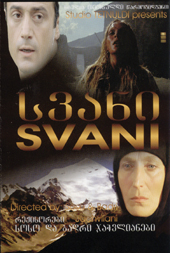Review: “Svani”
A captivating story life, love and blood revenge in Svaneti
By Alan Blyth
Friday, April 4
 Blood revenge is based on the sacredness of life and solidarity between members of the tribe or clan. This tradition is widespread even today in tribal societies including those living in the mountainous regions of Georgia, such as Svaneti.
Blood revenge is based on the sacredness of life and solidarity between members of the tribe or clan. This tradition is widespread even today in tribal societies including those living in the mountainous regions of Georgia, such as Svaneti.
When a member of one tribe is killed, whether deliberately or unintentionally, the kin of the dead person are bound to avenge his dead by killing the perpetrator or someone from his tribe. In Svaneti, this oath of blood revenge is sometimes made to an icon, and if this is done it further emphasizes the irrevocability of the proposed action.
“Svani,” a new Georgian movie directed by Soso Jachvliani and his brother Badri, is about life, love and feuding in Svaneti. It’s the Jachvliani brothers’ first attempt at directing, and they’ve taken an apparently true story and turned it into a captivating, compelling movie which shows how once the cycle of blood revenge starts in a small community even a family’s dog is not immune from the consequences.
Apart from taking blood revenge against members of other tribes, fathers in such conservative societies are sometimes driven by ancient custom to kill their own offspring if they are found to have committed an indiscretion. To kill one of your own requires great strength of mind, and refusal to carry out your part in such an agreement has its own consequences. This chilling sequence in the movie is brimming with tension and emotion and is one of the highlights.
Unlike other recent Georgian movies, “Svani” has no obvious evidence of foreign funding. However, despite the relatively tight budget—reputedly only USD 2 million—the Jachvliani brothers have managed to produce a well-made movie which has been highly praised at international film festivals. It deals with a fascinating subject, has a strong storyline, good acting and because it was filmed in Svaneti it has some stunning cinematography.
“Svani” has been packing in the punters for the last couple of weeks, but unfortunately the management of both the Amirani and Rustaveli cinemas slipped up by choosing to screen prints of the movie which don’t have English sub-titles, thus depriving the sizeable foreign community here of the pleasure of seeing this marvelous movie on the big screen. If you don’t understand Georgian and Russian you’ll need to go with someone who can explain what’s going on. And as it’s unlikely to be shown in Tbilisi’s main cinemas for much longer, catch it while you can.
